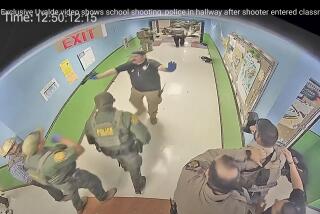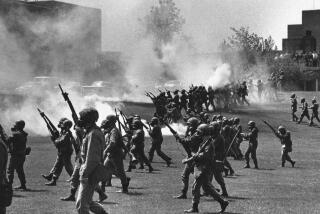Recall Bloody Recall
- Share via
STOCKTON — A second-grade teacher, Janet Geng, had playground duty that January day five years ago. She recalls breaking up a fight at the tetherball court, bending down to talk with a child, hearing a noise. She recalls clumps of asphalt kicking up along a straight line. She followed the line until she found the source. She saw a man in a military stance, a black gun and red sparks.
“Get down!” she screamed at the children. “Get down!”
These were the littlest students at Cleveland School, about 400 of them, and they filled the playground. Now some dove into a sandbox. Most ran for the schoolhouse. “Everything seemed to be in slow-motion,” Geng says. “Never had I seen so many kids running so slowly.”
Strange what memory will edit. Geng cannot recall the face of the gunman, who later would be identified as a mentally troubled drifter named Patrick Purdy. She cannot recall a child falling dead a few steps away, one of five Purdy killed that day before taking his own life. She does recall turning to run. Then she was on the ground. Her leg felt like a balloon that been blown too full and popped. She tried to slither across the pavement, but made no progress.
The gunman kept firing, sweeping back and forth, 105 rounds in all. She had to have seen his face. “On the fifth sweep,” Geng says, “I just turned my back to him. I remember thinking about John F. Kennedy. As a kid the big issue had been how Kennedy’s brains had splattered all over the car, and I told myself I did not want my brains splattered all over the playground. I thought about my children and waited to die. I don’t know how he missed me.”
*
Lori Mackey taught deaf children in a temporary classroom. She recalls looking out a window. Six paces away stood a man in battle dress, blazing away with an AK-47. “He had such a determined look on his face,” she says. Mackey can remember how Geng’s body jerked when the bullet hit, “but I can’t remember her falling down. I can remember the noise of the gun, but it was like I had no concept someone was shooting at the kids.”
In sign, she told her pupils to hide under a table. They watched the teacher and tried to read her face. She watched the windows, and could follow the tip of the rifle as the assailant walked right behind the classroom to a new shooting position. She kept her face blank. Survival, she remembers thinking, depended on quiet.
“I’m convinced,” she says, “that the only reason we’re alive today is that he didn’t know we were there.”
Across the playground, in another classroom, Melanie Foss had thought she heard firecrackers. She looked out and saw children running. The gunfire lasted only minutes, but her pupils stayed huddled on the floor a long time afterward, whimpering, whispering. They knew there were children hit outside.
“They were saying to themselves,” she said, “ ‘Is it my sister? Is it my brother?’ ”
Foss looked out again. She saw blood, bullet holes, bodies. Wounded youngsters were “piled up” outside classroom doors that had been locked at recess. What has stuck with her most vividly, though, is an eerie image of “basketballs and kick balls and other balls rolling slowly across the playground. It was all quiet, except for the distant sound of sirens.”
*
Five years later, these teachers still speak with something like awe about the power of Purdy’s assault rifle. It pierced holes in iron tetherball poles, ripped through walls. It was so loud that students dove for cover at a school three blocks away. Mackey’s pupils later recalled that although they heard nothing, they could feel the gunfire’s vibrations.
The carnage was extreme, breaking apart little bodies, leaving a hole in Geng’s thigh the size of a grapefruit. In a way, the bullets keep ricocheting. The teachers speak of disturbed children, derailed careers, bad dreams, divorce. “Oh,” says Foss, “I could tell you stories.”
After the shooting, Geng, Mackey and Foss all made public pleas for tighter controls on combat weapons. In return they received hate mail from gun enthusiasts. These gun people tend to see themselves as enlightened patriots, who alone perceive that massacres on schoolyards are but a cost of freedom.
From the gun ranks came people instrumental in forcing an election Tuesday in the San Fernando Valley. They want to “punish”--their word--state Sen. David Roberti for a bill that, in response to the Cleveland schoolyard attack, banned certain assault weapons. What they want is for “the people” to recall Roberti. What they don’t want anybody to recall, however, is what started all this. What they don’t want recalled is that bloody day in Stockton, Jan. 17, 1989.
More to Read
Sign up for Essential California
The most important California stories and recommendations in your inbox every morning.
You may occasionally receive promotional content from the Los Angeles Times.














